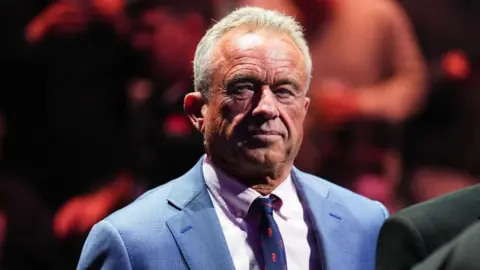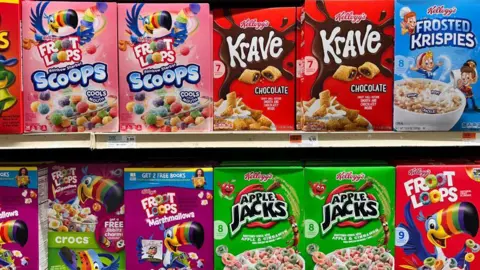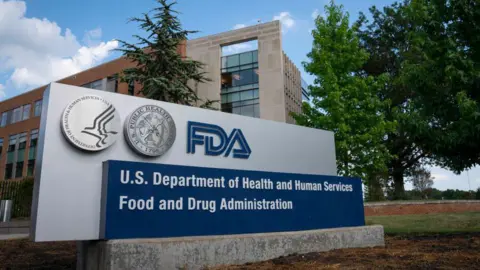Can RFK Jr make the American diet healthy again?

 Getty Images
Getty ImagesRobert F Kennedy Jr is determined to change the way Americans eat and drink.
From the dyes in Fruit Loops cereal to the seed oil in chicken nuggets, Kennedy — President-elect Trump’s pick to lead the Department of Health and Human Services (DHHS) — has long spoken out against ingredients he says are harming Americans’ health.
“We sell our children willingly [food] industries are toxic to them,” Kennedy said at a rally in November, after completing his independent presidential bid and endorsing Donald Trump.
But if Kennedy hopes to target junk food, he’ll have to shake up the country’s food laws first — and take on Big Food.
“What he is proposing is to enter the food industry,” said former New York University nutrition professor Marion Nestle. “Will Trump support him in that? I’ll believe it when I see it.”
The former environmental lawyer – who has yet to face confirmation by the Senate – is considered by many to be an enigma, given his history of making unsubstantiated health claims, including that vaccines can cause autism and that wifi technology causes cancer.
Yet some of his ideas about reforming the FDA have gained support from health professionals, lawmakers and concerned consumers alike — including some Democrats.
Kennedy “will help make America healthy again by shaking up HHS and the FDA”, Colorado’s Democratic Governor Jared Polis wrote on social media this week, accepting his nomination. After receiving public criticism for his praise, Polis deserved approval, writing on social media that “science must always be the FACT of our country’s health policy”.
Making America Healthy Again
Before the election, Kennedy – who was a Democrat – offered several ideas to deal with chronic diseases under his slogan “Make America Healthy Again”.
He advocates for an end to highly processed foods – products modified to include added fat, starch and sugar, such as frozen pizzas, crisps and sugary cereals, which are linked to health problems such as cancer, heart disease and diabetes.
He’s particularly focused on school lunches, telling Fox News: “We have a generation of kids swimming in toxic soup right now.”
Part of Kennedy’s new mandate will include overseeing the US Food and Drug Administration (FDA), which has more than 18,000 employees.
The agency oversees drug and food safety in the US, but has faced controversy in recent years from some lawmakers and consumer groups, who have accused it of a lack of transparency and measures regarding food safety.
The 70-year-old suspect has pledged to take control of the company and fire the employees he says are part of a “corruption scheme”.
“There are whole departments, like the food department at the FDA … that have to go, that aren’t doing their job,” Kennedy told MSNBC this month.
He also insisted that food dyes, including Red No. 3, and other additives banned in other countries.
The former Democrat has also raised a number of controversial health issues, including fluoride in drinking water, which he says should be completely banned, and raw milk, which he believes has health benefits despite the increased risk of bacterial contamination.
He also came after seed oil, writing on social media that Americans are being “unknowingly poisoned” by products like canola and sunflower oil used in fast food.
 Getty Images
Getty ImagesWhat is the evidence?
Many public health experts are following Kennedy’s goal of tackling highly processed foods, which they say the US consumes at much higher rates than many other countries.
“It’s nice to hear someone argue about doing something about an incurable disease,” said Ms. Nestle.
Kennedy’s goal to eliminate certain food additives and dyes could also be beneficial, said Dr. Peter Lurie, executive director of the Center for Science in the Public Interest, a nonprofit group that advocates for food safety.
The former FDA official said many food dyes, including Red No. 3 – banned in California – should also be banned by the US government due to concerns about carcinogens.
The FDA has rejected Kennedy’s claim that the US allows thousands of additives banned in the European Union. A spokesman said it was necessary to “dig deep and understand the context behind the numbers” when comparing US and EU regulations, which use different methods.
But public health experts and former officials say many of Kennedy’s goals were inappropriate — and in some cases, dangerous.
For example, drinking raw milk – a process that helps kill bacteria – can make people sick or even kill them, research has found.
“There is no evidence of any nutritional benefit of any magnitude that we know of from not eating dairy,” said Dr. Lurie.
Kennedy’s proposal to remove fluoride from drinking water could also be problematic, because fluoride, at low levels found in water, has been proven to improve dental health, Ms. Garner said.
Removing it from the water will also be out of his control, because fluoride levels are regulated by the states.
And his claim that seed oil is helping to fuel the obesity epidemic is not based on science, however, Dr. Lurie said.
“We don’t see evidence of that. In fact, they appear to be such important products that they are replacing saturated fats” like butter, he said.
Taking a Big Meal
Dietary changes, while part of the public health conversation, may not be politically and legally realistic, some experts say.
“It’s a lot more complicated than it lets on,” said Dr. Lurie. “These are real challenges, and you’re going to face industry resistance every time.”
First, the FDA does not have jurisdiction over all seizures of “highly processed foods”, several former officials told the BBC.
Rather, they say, the process is more complex. Both the US Department of Agriculture and the FDA regulate the food industry. The FDA doesn’t make laws – it makes policies passed by Congress and works to limit unhealthy foods by enforcing restrictions and labeling on certain nutrients, such as sodium and saturated fat.
Kennedy’s comments “make a lot of political propaganda,” Ms. Garner said. “In my opinion, I don’t see how that is possible without drastic changes in other policies and infrastructure.”
He will also face industry backlash over proposals to ban pesticides and genetically modified organisms commonly used by American farmers, former FDA officials said.
“Businesses will complain,” said Rosalie Lijinsky, a former FDA official for 33 years.
The industry is used to limited oversight from both Democrats and Republicans — including under Trump’s first term — while most of Kennedy’s policies would involve making more regulations.
Several food industry groups met with lawmakers before Kennedy’s nomination this month to oppose him, Politico reported last month.
Republican Senator Chuck Grassley, of Iowa, said this week he planned to meet with Kennedy before his confirmation hearing and “spend a lot of time teaching him about agriculture”.
Kennedy’s position puts him at odds with President-elect Trump, a fast-food enthusiast who worked to roll back strict school lunch health requirements during his first term.
“You get some ideas that make sense, but it’s exactly the kind of thing that these administrations are hostile to,” Dr. Lurie said.
In a statement sent to the BBC, the Food Industry Association, which represents food retailers, manufacturers and producers, such as General Mills, said it looks forward to working with the Trump team “to ensure that food and drug policy continues to be based on science, to reduce regulatory complexity”.
The industry’s complaints about Kennedy’s agenda are not surprising, said Jeff Hutt, a spokesman for the political committee Make America Healthy Again, which is urging Republican lawmakers to confirm Kennedy.
The purpose of the health movement, Mr Hutt said, is to “put American health above corporate profit”.
“Even if the idea of banning ultra-processed food is politically impossible, it is a discussion we should have,” he said.
 Getty Images
Getty ImagesHow to change
Kennedy could still work within existing US regulatory frameworks to improve America’s food systems, former officials said.
Ms. Nestle said Kennedy could eat more processed foods by changing the US Dietary Guidelines, which set nutrition standards for industry and federal government programs, including school lunches and military meals.
“They have a big impact on the food industry,” said Ms. Nestle. “That can make a big difference.”
The guidelines are updated every five years by the US Department of Agriculture and DHHS, which previously said there was insufficient evidence against highly processed foods.
Still, officials and nutrition experts have raised concerns about the ways Kennedy has proposed to carry out his agenda, including firing FDA nutritionists.
This move will have a major impact on food safety, Ms. Lijinsky said. “If you lose your top experts, you’re going to have problems,” he said.
In the end, Ms. Garner said it is difficult to separate some of Kennedy’s food promotion goals from the false health claims he has spread.
“There is an opportunity here,” said Ms. Garner.
“But I think there’s a valid concern based on other issues and how his approach to those issues might play out here.”


Source link




